While the International Institute of Information Technology Hyderabad has a prevailing competitive coding culture, to ignore its non-geeky vibrant side would be missing the complete picture. Here’s an attempt to compile some of the non-academic activities that seem to be thriving despite moving into the virtual realm. Read on.
Engineering aspirants in the quest of a well-rounded academic programme along with a vibrant campus atmosphere typically take to Quora before making an informed choice. However, responses on the Q&A platform reveal that the International Institute of Information Technology Hyderabad has been typecast as one where only academic pursuits and intellectual accomplishments are encouraged, ignoring the fun side. “It’s not uncommon to find posts stating ‘Academics = IIIT Hyderabad, Student Life = IITs’”, rues Naren Akash R J, the Secretary of the Clubs Council at IIITH. It’s to change this prevailing mindset about IIITH that the Clubs Council, an autonomous students body along with its numerous coordinators has been working hard to map students’ interests with corresponding groups. From modest beginnings with a handful of clubs a few years ago, the institute today boasts of over 20 of them covering a myriad of themes and eclectic interests such as music, astronomy, gaming, art, dance, sports, literature, frivolous humour, foreign languages and many more.
Club Structure
The Clubs Council typically consists of three members, a Secretary (a 3rd year undergraduate) and two UnderSecretaries (2nd year undergraduates), Mayank Goel and Tejasvi Chebrolu. The three liaison between the various clubs and the SLC which funds and provides administrative and infrastructural assistance for smooth functioning of the clubs. Giving a peek into the history of the student body, Naren says, “The Clubs Council came into existence in 2017-18. Previously, there used to be an Activity Council looking after club activities and cultural activities. Now, we have two separate bodies – Clubs Council and Cultural Council.” There is a division based on the kind of activity that the club is involved in. There are around 14 clubs listed under the Cultural Clubs and 6 under the Technical Clubs. With the intent of encouraging active participation from all batches (including the post-graduate students), there is also no limit to the number of coordinators for each club. The working of each club is diversified under teams in charge of Marketing, Events, Social Media, Logistics and Finance. “Many of the clubs now have PG coordinators too which was not the case previously,” says Naren. The establishment of a technical team with Vishva Saravanan and Dhruv Kapur has resulted in the development of a portal which serves as a one-stop shop for all paperwork and event-related information of various clubs. “Rather than keeping track of budgets and financial approvals via email, there is transparency and easy accessibility of such information online,” asserts Naren.
Interested? Hop On!
Kickstarting a new club as well as induction into one are both very informal in nature. For a new club to begin, all it takes is a group of interested folks. “It’s when these interested few graduate and new coordinators lack the same passion as the initiators that the clubs usually become defunct. In other colleges due to a much larger student body, there’s typically someone out of the many who can pick up the slack, but here due to the significantly smaller numbers, if there is no one willing to put in the effort to conduct activities, then the club dies a natural death,” explains Ujwal Narayan, the previous Secretary of the Clubs Council. That said, the past year has seen a revival of many clubs and the last few months in particular have seen a renewed interest and unprecedented participation from students in extracurricular activities. “Everyone got more busy online during the pandemic. A lot of groups were formed. Even existing clubs that didn’t have much of an online presence ventured into Instagram, YouTube channels and others. What’s happening is that previously students used to hang out only with those in their close circles, but now with everyone online, people across batches are in a single group. They can chat and get closer. It’s actually proving to be beneficial,” says Naren, adding that it’s also far easier to log in and join an online event than physically making way to a location on campus. “Participation in the events has increased beyond our expectations!,” he exclaims.
Serious And Frivolous
While the Foreign Language Club, the Developer Students Club and the Amateur Sports Enthusiasts Club are some of the newest clubs on the block, there are a few others that are making waves on online platforms. Better known for their ‘Roast’ events, the Frivolous Humour Club was initially started in response to the seriousness steeped in the college. “Previously known as just the Humour Club, the frivolous bit was added to indicate that as a club, we don’t want to be formal proceedings within the confines of the daily humdrum. This can probably be seen in the large attendance during our open-mic sessions, where everyone is encouraged to come and talk about issues from politics to the qualms of their workload,” says the team. For those who enjoy pure theory in Mathematics, Theoretical Physics or Theoretical Computer Science, there’s a niche group known as the Theory Reading Club. According to the team, the idea behind it is to learn interesting ideas from each other (either one-shot lectures or sustained classes) and build an atmosphere conducive to research. “We feel that pure theory is under represented at IIITH and hence even if we extend this to the intersection of theory and practical work, we’d like to maintain our leanings towards theory,” they say. For the trivia lovers and the cerebrally inclined, there’s the TV Room Quiz Club. It derives its name from the TV Room at OBH where it originally took off 7 years ago. The club conducts quizzes in collaboration with the SLC and internal clubs like the Literary Club, as well as external enthusiast groups like the K-Circle. Apart from the formal quizzes conducted by the club, the club also maintains a Facebook Group with around 1000 members, where questions are posted regularly by anyone on the group (not restricted to the club members), and has resulted in maintaining an online community. During the lockdown, events have been hosted on a regular basis on Discord, a platform popular for its rich messaging and audio-visual features, says Mukund, the club’s coordinator.
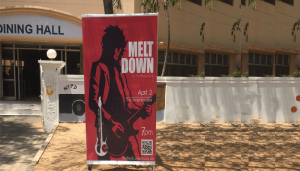
Music And Dance
In March, when the Coronavirus cast its shadow on life as we knew it, one of the first events to get impacted was the Meltdown. Describing it as a “flagship event conducted every March/April”, Abhinav Gupta, coordinator of one of the oldest clubs on campus, the Music Club, calls it an “emotional” one too since it is the last event of the year with the graduating students’ last performance on the IIITH stage. “It is one of IIIT’s biggest events, with professional lights, a rock n’ roll sound system and breath-taking smoke effects! Those smoke machines are expensive, so we save the smoke machines exclusively for this event!,” he says. While this club has turned virtual too, the members can’t wait for things to go back to the pre-pandemic days. “We never even needed social media before! I mean, we had a simple Facebook page and typically we’d send out an email before every event, but that was about it. The heart of the club was our physical presence, which was always felt in the air,” claims Abhinav.
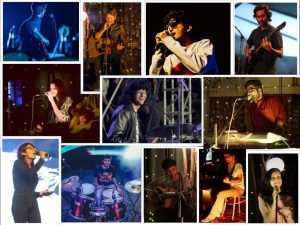
The Dance Club seems to be currently riding the popularity wave in terms of student engagement and enthusiasm. For Independence Day, the members created a video which was choreographed and brilliantly executed in perfect synchrony. “Every so often, you will find 50-odd people logging into a Google Meet and dancing away,” says Naren in admiration.
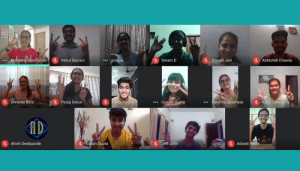
Art And Science
The Programming Club is led by a group of great coders (no surprise here!) on campus which organizes frequent educational meets and inspires students to aim at ICPC every year. Their annual flagship event CodeCraft gets 1000s of students participating from across the world. If coding is here, can hacking be far behind? There’s a Hacking Club too which encourages students to understand about vulnerabilities, and security aspects, and organizes Break-In their flagship event. There exists a Gaming Club too whose members are in the midst of creating a virtual campus on Minecraft.
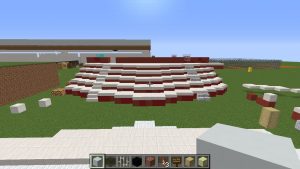
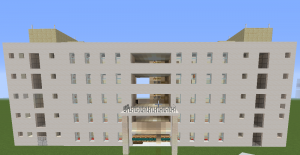
With the campus out of bounds currently, the team has been building it virtually, block by block. Speaking of campus, first-timers who arrive here are always awed by the colourful paintings on walls and benches should know this: It’s all thanks to the Art Society.
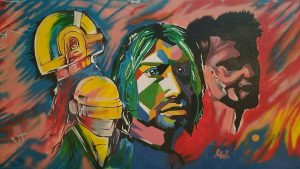
Recently on the occasion of Independence Day, in conjunction with Pentaprism, the Photography Club, they created Swachitra – a mosaic of the Nilgiri building with around 6000 images taken on campus by students and faculty alike. Pentaprism maintains an active FB group known as the Creative Eye where monthly photography contests are held. For stargazers and night sky lovers, there’s the Astronomy Club which organizes several sky gazing sessions in the countryside. The latest update on their front is that they have ventured into the field of Computational Astronomy. Open Source enthusiasts have to look no further with the presence of the Open Source Developers Group which actively encourages students and helps in contributing to open source projects. They provide the perfect platform for an introduction to open source and introduce students to events like the Google Summer of Code (GSoC) and also conduct technical education sessions. The Chess Club is a small active group which has continued to actively engage with its members through fun games in the online format.
Popular Others
Ping! and the E-cell are two other hugely popular student-led initiatives on campus. The former is a newsletter initiative run for and by the students, while the latter aims to spark the entrepreneurial spirit amongst them. Though technically not “clubs”, they are akin to the club-like bodies but work outside their formal structure. There are other special interest groups too which don’t fall under the purview of clubs such as the Anime Group and the Football Fans. They organize screenings and facilitate discussions regarding the topic at hand but are not formally recognized as clubs. They do however act like one for all intents and purposes.
Collaborations
While collaborations with other clubs have always existed, they seem to have gotten more interesting. Recently the Literary Club went on to collaborate with over 10 other clubs in a single week for Harry Potter’s birthday celebrations. “It was one of the largest events conducted by a single club. With the E-cell, they had collaborated to have a magical pitching session, with Pentaprism, they ran a competition related to DIY Cosplays. Essentially students had to come up with a multitude of creative ideas related to magic and enchantment,” says Naren. Inter-institute collaboration also seems to have picked up. The Electronics Club has tied up with IIT Kanpur with a joint event on the anvil. The Debate Society recently concluded a similar event held jointly with a college from Delhi University.
Virtual Welcome
As part of the online induction to the first batch of undergraduates this academic year, a virtual tour of the campus was organised. Naren explains how that happened. “A PG student who is currently on campus captured an hour long video of the campus. The photography team (editing and design) burned midnight oil for around a week, and created a 7-minute amazing video of the campus”. It contains both the current locked-down campus and bustling atmosphere from the pre-pandemic days. For the latter, they crowdsourced videos from students and faculty and showcased events as they typically happen across various campus locations.
Changing Mindsets
The last academic year saw more than 300 events taking place on campus including Felicity, of which club-related events were over 120 in number. Something which the students term as “a milestone for IIITH”. For those who complain about lack of time to indulge in such activities, Abhinav says, “It’s all about time management at the end of the day. We’ve all got 24 hours in the bag, and we ensure to use these 24 hours judiciously and effectively, completing our assignments and successfully conducting at least a few quality events every semester!” When new joinees went through a 2-day orientation on all the clubs, they were taken aback by the extensive extracurricular activities hosted by the institute. “They said that they would go onto to Quora and write about all their positive experiences and change popular perception,” says Naren happily.
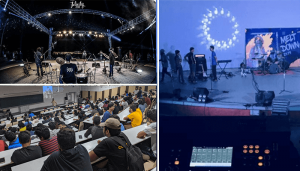

Sarita Chebbi is a compulsive early riser. Devourer of all news. Kettlebell enthusiast. Nit-picker of the written word especially when it’s not her own.

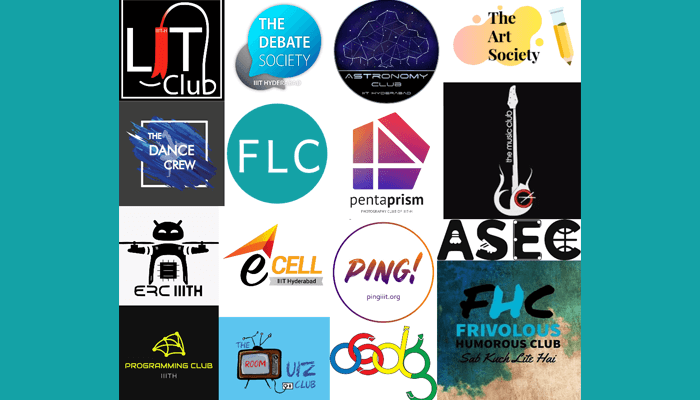
Next post